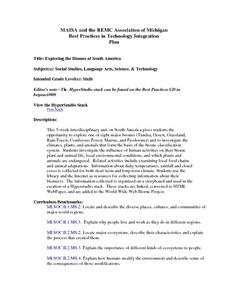Curated OER
A Day in the Life
Students use their research skills to investigate the behavior and characteristics of a rainforest animal. After creating a diary entry, they illustrate the habits and life cycle of the animal. They write the diary entry from the point...
Curated OER
Wildlife
The centerpiece of this lesson plan is a predator-prey simulation in which colored paperclips represent different species of animals camouflaged against a colored background. Relevant follow-up questions are provided. The activity is...
Creative Educator
Design a Rainforest Postcard
Send your class on an expedition through the rainforest! Along the way, they will write informational postcards to demonstrate what they've learned. Each team will be responsible for one of five rainforest regions. When they return from...
Curated OER
Spying on Spiders
Students investigate spiders. In this spiders lesson plan, students create a habitat for a spider with a jar, twigs, and dirt. Students observe the behavior of the spider and record how they spend their days.
Curated OER
Exploring the Biomes of South America
Sixth graders complete a five-week unit investigating the eight major biomes of South America. They conduct Internet research, collect short-term and long-term climate data, and create a HyperStudio slideshow stack about a selected biome...
Curated OER
The Pipa Pipa Frog
The Pipa Pipa frog is the focus of this reading comprehension worksheet. After reading a passage and studying a photograph of the frog, students complete eighteen phrases that tell about the frog.
Curated OER
Environmental Science/Water Pollution
Students study natural habitats, aquatic life, renewable and non-renewable resources. They discuss conservation efforts for sea otters and desert toad in this units.
Science Struck
Science Struck: Rainforest Food Web
Explains the characteristics of tropical and temperate rainforests and what rainforest food webs look like.
Scholastic
Scholastic Explorers: Endangered Ecosystems
A great site with something for all grades. Do research on rainforests, follow field research on animals in Latin America, and show what you know through interactive assessments. Lots to see on this site which is a collaboration of...
American Museum of Natural History
American Museum of Natural History: Welcome to Dzanga Sangha
Connect the dots to investigate three different habitats either the forest, bai or river of the rain forest. By connecting the dots students make a food chain to see how organisms in each habitat depend on each other.










